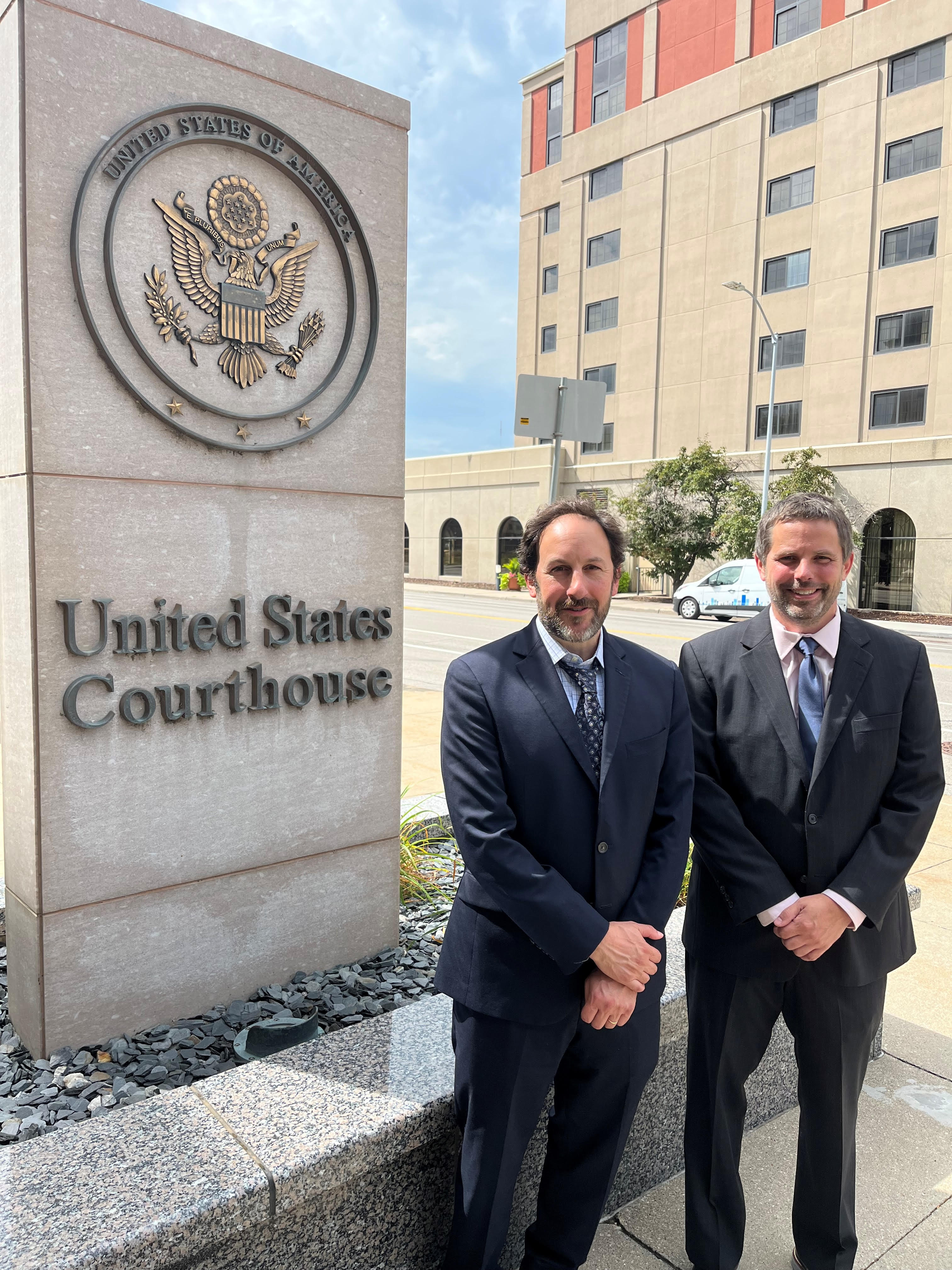The nomination of Stephanie Rose to be the next United States Attorney in the Northern Distric of Iowa is an issue that needs sunshine. We should all care what about happened at the Postville Prosecutions and that Assistant United States Attorney Stephanie Rose played a central role in the prosecutions. We should all care because never in the history of the United States have there been federal prosecutions conducted like the ones that occurred stemming from the Postville ICE raid.
We believe that before Stephanie Rose is confirmed as a United States Attorney, the public has a right to know what kind of prosecutor she will be. A careful public review of her record is essential. It is critical that the public be able to determine what her views are regarding the Postville prosecutions as she has been quoted as calling Postville ” a ton of good work.”
We deserve to know if Rose ever raised her voice in opposition to the Northern District’s use of coercive prosecutorial tactics against the Postville workers? Even Privately?
To date no one has been held accountable for the due process and civil liberties violations of that occurred in Postville prosecutions No one is asserting that Stephanie Rose should be held solely accountable for the Postville prosecutions. However, there is no doubt that the Postville prosecutions were the most important cases to occur in the Northern District of Iowa since Ms Rose has been employed in the office. The fact that the cases occurred while she was in a leadership position and “played a central role in the raid and prosecution” is an important part of her record that requires careful examination.
Even if it is true that Stephanie Rose played no direct policy role in the Postville prosecutions, she was still acting according to her oath as an officer of the court and as a federal prosecutor. Ethically and morally, her hands were not tied once she was given her Postville prosecution assignment to negotiate the “exploding” seven-day plea agreements with attorneys representing the workers. Even if the “raid was initiated by Washington,” or the prosecution designed by other prosecutors in her own office, as Chief Deputy of the Criminal Division and as an Assistant United States Attorney, Ms Rose still had made ethical duties. It was her responsibility to carefully review and scrutinize each prosecution for any ethical or constitutional due process problems. The ethical and constitutional issues created by the prosecutions were numerous and should have been obvious to her. Either Ms. Rose was not able to understand the numerous defects in the prosecutions, she chose to overlook the defects or she just plain failed to see any problems with the prosecutions as executed. Any one of these conclusions raises serious questions about her judgment and fitness to be an United States Attorney at this point in her career.
It really concerns us that no serious reporting has covered Stephanie Rose’s professional record and in particular her role in the Postville prosecutions. Senator Harkin touts her as leader but completely fails to hold her accountable for any thing bad that has happened in the Northern District office during her tenure. Once Harkin nominated Rose, he decided he would support her and does not want to lose face.
The Postville Prosecutions are arguably the most egregious use of federal prosecutorial power this century. At the time of the Postville Prosecutions, Rose was not a low ranking member of the office but was in a leadership position as third in charge in the office for criminal prosecutions behind only United States Attorney Dummermuth and Chief Deputy Richard Murphy. Recently, Stephanie Rose was asked about her role at Postville. She defended the raid and prosecutions saying “executing the massive operation required amazing effort and a ton of good work.” (See Waterloo Courier article from April 5, 2009 .)
The plea agreements negotiated by Stephanie Rose were calculated to take advantage of the workers worry about families they had been supporting with their wages. Almost all workers were represented by lawyers with little or no immigration expertise that were forced to represent on average 17 workers during a very short period of time. Clearly this was premeditated and calculated to force the workers to waive all rights and submit to the criminal charges and then deportation after serving five months in prison. Stephanie Rose is apparently blind to the fact that the Postville workers were begging to be released to go support their families in Guatemala . Her “ton of good work” really amounted to ramming these cases through before anyone could raise an effective defense. Her record at best, even without the Postville Prosecutions, was mediocre, her role in the prosecutions is more than troubling but her unqualified support for the Postville Prosecutions and ICE raid tactics even with the benefit of hindsight makes her nomination a complete disgrace.
It seems more than implausible that Stephanie Rose while operating in the position of Chief Deputy of the Criminal Division had no clue that the Postville prosecutions were being planned by her colleagues in the Iowa office until just before the ICE raid. It also seems implausible that she would have no prior knowledge of the ICE Postville investigation nor that criminal complaints and criminal arrest warrants for 697 Postville workers that were being prepared and sought by her office some 30 days before the ICE raid. Either Rose was involved in the Postville prosecutions to a greater extent than she has being willing to acknowledge or she was displaying that leadership trick of “putting her head in the sand.” Neither of these conclusions is what we would expect of a United States Attorney candidate.
Even more importantly is what she did after she found out about the prosecution plan-did she ever raise any concerns? When? With whom? Why a year later is she quoted as calling the Postville ICE raid and Prosecutions “a ton of good work?”
Even if it is true that Stephanie Rose played no direct policy role in the Postville prosecutions, she was still acting according to her oath as an officer of the court and as a federal prosecutor. Ethically and morally, her hands were not tied once she was given her Postville prosecution assignment to negotiate the “exploding” seven-day plea agreements with attorneys representing the workers. Even if the “raid was initiated by Washington,” or other prosecution designed by other prosecutors in her own office, as Chief Deputy of the Criminal Division and as an Assistant United States Attorney, Rose still had ethical duties. It was her responsibility to carefully review and scrutinize each prosecution for any ethical or constitutional due process problems once she became involved as an officer of the court.
The ethical and constitutional issues created by the Postville prosecutions were numerous and should have been obvious to her. Stephanie Rose was not able to understand the numerous defects in the prosecutions, she chose to overlook the defects or she just plain failed to see any problems with the prosecutions as executed. Any one of these conclusions raises serious questions about her judgment and fitness to be a United States Attorney at this point in her career.
Why not clear up the issue of Stephanie Rose’s role and release all emails and memos that describe her role? Likewise, she should volunteer to answer questions under oath about her Postville role and her views on basic criminal justice issues. AG Holder certainly made his records and emails available to the public during his vetting. Why is Harkin keeping us in the dark?
Rose has refused to meet with the leaders of Postville to talk about the case-what is she hiding?
Minimally, she helped railroad the least powerful people in Iowa and now that they are gone no one but a few in the clergy seem to care how outrageous they were treated. This is being swept under the rug -which is what Harkin and Rose want to happen. Please help shine sunlight on this issue.
Iowa deserves better! There must be better attorneys in Iowa other than an attorney without a cloud over her head…
Continue Reading...


